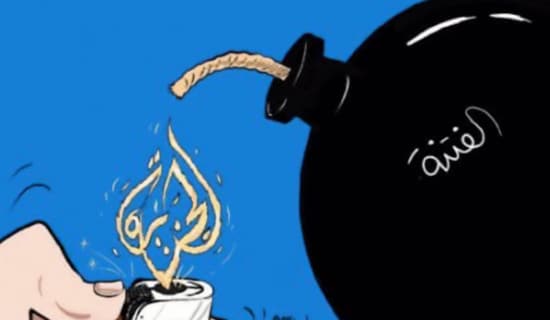In an article titled "Why an Even More Difficult Future Awaits Us, Palestinians and Arabs," [1] liberal Tunisian columnist Lafif Lakhdar wrote in the London-based Arabic daily Al-Hayat:
The Missed Opportunity of July 2000 and Its Consequences
"My generation opened its eyes with the loss of Palestine, and is about to shut them with the loss of the opportunity to retrieve what can be retrieved from it. No doubt, the Palestinian issue is the mother of all our issues, and its solution depends upon the possibility of bringing our societies to modernization, which in turn, is for us a matter of 'to be or not to be...'"
"Until 2000, the solution was within reach. But the Palestinian leaders refused to extend it a hand. This was the last costly missed opportunity to get back the land, and with it a measure of honor that would have been sufficient to heal our wound, which has bled since our defeat by Napoleon in 1798 and more since we were defeated by Ben-Gurion in 1948."
" Clinton presented proposals to the Palestinian leaders on a golden platter, and they answered him with an Intifada of armed struggle and suicide bombings – in an era when these are no longer appropriate. Thus, at one blow, we lost [both] the land … and our reputation. The occupation army returned [to the territories] and in everyone's eyes our image was tarnished by egotism unprecedented in our history."
'The Vast Majority of Arab Intellectuals, the Arab Street, and 80% of the Palestinians – Supported Suicide Attacks'
"…Before our suicide operations against Israeli citizens, our image was one of men struggling for liberty. But when the most important Palestinian organizations – among them Fatah – became involved [in suicide attacks], and when the vast majority of Arab intellectuals, the Arab street, and 80% of the Palestinians - supported them, we were slapped with an image of a suicide [attacker] who disdains life – his life and the lives of others."
"When we lost the media war, our back was exposed to Sharon, who gave it a military and political knockout with the “ Defensive Wall” war, and then with “ Determined Path.” Thus, defeated, the Palestinian and Arab street submitted to bitterness over their fate, as happened on the morning of the 1967 defeat."
Comparing the First Intifada to the Second
"It is reasonable to assume that now the Arab-Israeli conflict, and primarily the Palestinian-Israeli conflict, will be resolved … by coercion and humiliation – on the basis of the current balance of power."
"We, the majority of the elite and the public, welcomed the Oslo Accord despite its modest [scope], because it was the jewel in the crown of the victory of the Intifada of the ' Children of the Stones,' that reshaped the world consciousness by inverting the symbol of the Israeli David and the Philistine Goliath transferring the sling, for the first time in history, to the hands of a Palestinian confronting an Israeli tank."
"[Now], the probable solution reflects the result of the defeat of the Intifada of the Suicide Bombings, which has killed two birds with one stone: [first] it wiped out the first Intifada's political-symbolic achievements; [second] it revived and then dashed hopes in the Palestinian and Arab street, only to bring back the occupation..."
Arab Responses to Defeats – Historical Observations
"Historically speaking, elites [of nations] have responded to defeats in two ways. [The first was] a creative response to challenge, as the elites in Japan and Germany did in the 19th and 20th century when they opened up to modernization in the economy, politics, sciences, and philosophy, in a way unprecedented in their national autocratic history. [The second was] a conceptual introversion within these nations' identity in which emotionalism overrode rationalism..."
"Our reaction to repeated defeats over the past two centuries [unlike the Japanese and the Germans] was as follows: After every defeat, we became less courageous in asking [ourselves] painful questions, and more deeply mired in the culture of finding excuses, placing responsibility for our defeats on the unknown and settling for complaining about the trap laid by the West and its 'stepdaughter' Israel, who have targeted our land and skies."
"All this [has happened] without us asking [ourselves] the embarrassing question of whether internal factors have made us, unlike all other nations, easy prey to all. The [Arab] elites have opted for … denying their overwhelming responsibility for these defeats."
" The Algerian prince Abd Al-Qader was responsible for the defeat of his people by the French occupation, because he preferred [to follow] a religious ruling issued by the Mufti of Fas [Morocco] and opted for suicide and Jihad, to the last of his men, rejecting the proposal to divide Algeria between him and the occupiers and to wait for better days when it would be possible to regain the usurped part as cheaply as possible. [Ahmad] 'Urabi [an Egyptian officer who clashed with the British in 1882]chose hopeless resistance over negotiations with the conquerors which could have reduced losses. Arafat tore up Clinton's proposals and rode [the wave of] the Intifada of the Suicide Bombers, only to lead his people to a dead end."
The Palestinian 'Failure Neurosis'
"What caused these leaders, primarily the Palestinians among them, to lead their peoples to perdition?"
"[I believe] it is the 'Failure Neurosis' that compelled them to do everything within their power to punish themselves and their peoples with failure where success was certain. Their 'Failure Neurosis' has several symptoms:"
"Conceptual Stagnation, making them incapable - at every stage of the struggle - of reading the regional and international balance of powers, and incapable of drawing the necessary conclusions, so as to make a political and military decision in keeping with the situation."
"Political Backwardness, preventing them from changing their means of struggle, way of thought, and goals which are not compatible with the political changes. [This political backwardness] makes them resist the changeover of the generations, in both the government and the opposition, and made them prefer yes-men over knowledgeable people."
"The Mania of the Armed Struggle,with all its terrible ramifications – transforming the armed struggle from a means serving the ultimate goal of a viable Palestinian state into a goal in and of itself. This is the cause for the missing of historical opportunities since 1937 to 2000, with … pristine excuses such as 'we have the right[s] on our side' and 'time, geography, and demography are working in our favor.'"
"Inability to Define the National Interest, Are we talking about the liberation of Mandatory Palestine, or about regaining what can be salvaged of the Palestine occupied [by Israel] in the 1967 war? What are the optimal means of armed struggle for actualizing one of these two options? Are we talking about an Intifada of armed struggle and suicide bombings, or about negotiations, or about both – as maintained by Marwan Barghouti – in hope that this will place the Sharon government between the rock of the Intifada and the hard place of negotiations?"
"Perhaps the latter is the decision of the Palestinian leaders, but it does not serve the national interest one iota. Like every improvisation, the decision-making process that nations follow was not carried out [by our leadership]. [That is], taking on the opponent's role so as to [assess] what his counter-decisions will be. Thus, our decision is like those made out of mental sloth."
"Finally, a [last] symptom of the 'Failure Neurosis,' which forces these Arab leaders to act without knowing what their enemies want from them, is the Prohibition on Free Internal Discussion and Moderate Discourse – which usually arise from a serious analysis of the data. The verbal radicalism sweeping our culture and the emotionally charged words … fills the vacuum created by the lack of analysis and the vacuity of thought."
"Words packed with content such as 'rationalism,' 'moderation,' and 'concessions' arouse horror. What meaning could concessions and interim solutions have when compared to 'the sacred rights' – which exist, of course, only on paper?..."
Palestinian Leaders Have Handed Down a Death Sentence for Palestinian Intelligence
"In reality, restoring [Palestinian rights] is impossible – but reality is the last thing that interests the bewitched way of thinking in which the value of words equals their content."
"Thus, these leaders have handed down a death sentence for Palestinian intelligence. It is no accident that most critical Palestinian intellectuals have preferred remaining outside the leadership; it is no accident that their proposals do not resonate among [the leaders]. There is no doubt that this is one reason for the absence of a Palestinian political program enjoying international trust…"
[1] Al-Hayat (London), July 21, 2002.




